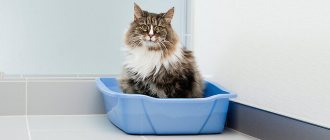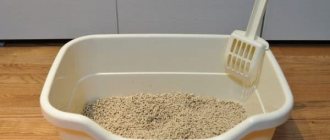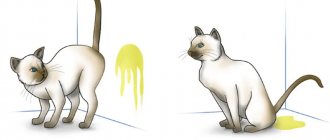I have a Highland Fold cat, he stopped going to the litter box, no matter what I did, I bought sprays and washed them with different products, but he still walks past the litter box. Tell me what to do? Olga
Agree, the problem is painful. And so much so that sometimes it becomes the reason for abandoning the animal.
So, one day the pet suddenly stops going to its native litter box. It seems like out of the blue (from the owner’s point of view). Maybe completely, or maybe partially, which is not clear at all.
Two traditional questions arise: Who is to blame? and What to do? Well, let's try to figure it out.
A cat may begin to ignore its litter box for two reasons – medical and behavioral.
Possible reasons
There are many more motives that prompted a cat to abandon the litter tray, and not all of them are directly related to the toilet itself.
The most common reason is stress experienced after the owners move to a new place of residence, renovations, the arrival of guests, the appearance of a small child or another animal in the family, in which the cat will see a “competitor” or strangers in the house. Often cats begin to shit on the sofa or other places due to health problems, this mainly applies to neutered cats. For some time after surgery, the cat cannot control its bladder and recover from stress and anesthesia, so be prepared - a “fragrant” puddle may appear on the floor, carpet or furniture at any moment. In a few days everything should return to normal.
However, castrated individuals are very likely to develop diseases of the urinary system (cystitis, urolithiasis, etc.). The cat does not go to the toilet due to severe pain. Instead of blaming the animal, you have no choice but to immediately take it to the veterinary clinic for an examination.
How to deal with associative urination
It happens that a cat simply confuses some surfaces and objects in the house with its own litter box. And this phenomenon is called associative urination.
Urinating on "substitute" cat litter
If the floors in the apartment are covered with carpets with soft matter, then some cats can easily confuse it with litter tray. The tactile sensation is almost the same; soft pile is easy to move with paws. It is not surprising that in such cases a conditioned reflex is triggered in cats, and without hesitation they defecate on the carpet. Additional proof of this is that animals are not inclined to completely abandon the tray.
What to do in such a situation? The best thing to do is to remove carpeting until the cat develops a strong associative connection between its litter box and the place where it needs to do its business. In order to help the animal quickly get out of the habit of defecating on the carpet, you can increase the area of the cat litter box by connecting several trays together, or purchase a container of maximum size that will resemble a carpet. Over time, the pet will get used to always going to the same place and will stop relieving itself anywhere. Then the number of trays can be reduced, but this must again be done gradually.
Urinating on owner's things
This is usually the case with older cats who, due to their age, experience problems with their health and well-being. As a rule, such animals cannot control their bladder in the same way as when they were young. In addition, over the years, a pet's nervous system becomes depleted, and all this forces it to relieve itself in inappropriate places. Most often, for these purposes, cats choose places where the owner’s smell is especially strong - his personal belongings or bed. And all because when smelling it, an old cat feels more confident and protected, and can at least temporarily relax and relieve nervous tension.
At the same time, young healthy cats can demonstrate similar behavior in cases where the owner is often absent and rarely appears at home. In such situations, the animal cannot help but feel anxious and, in order to express its protest, defecates on the owner’s things. This gives her a feeling of security at times when no one is home. The cat is clearly sad, and in such cases affection, attention, and double care will help to cure it.
Sometimes an animal marks only things that belong to a particular person, without touching the rest. What can I say? Only that in this way the pet is trying to demonstrate its antipathy towards any of the family members or people coming to the house. A cat’s negative attitude towards individuals can and should be corrected.
Possible reasons
Before you scold your pet or take any action, you need to know why cats shit on the bed. It is believed to be related to revenge or bad parenting
But more often animals behave this way to attract the attention of their owners. Most likely, the pet has some psychological problems or illnesses
Cats are clean; if properly maintained and without problems, they will only go to the toilet in their litter box.
It is especially unpleasant to find a puddle or pile in bed. This can happen even to a well-mannered, neat pet. There are several reasons why cats shit on the bed. Most often they are associated with the pet’s toilet:
The most common reason that a cat begins to shit in inappropriate places is a dirty litter tray. All animals hide their smells, it's instinct
It is very important for them that the tray is clean and the filler is dry. If the place where the cat goes to the toilet smells unpleasant, he will look for another. Often cats shit if they don’t like the tray itself, its shape or filler.
Some cannot go to the toilet house, others need a lot of space around. If the owner decides to change the litter, the cat may begin to look for a more comfortable place. Puddles on the bed may appear if the tray is moved to another place. For some animals, even a few centimeters are important. Often the owners themselves provoke the pet by closing the door to the toilet where the tray is located. Perhaps the wrong location for the cat litter box has been chosen. It is necessary that the animal is calm while relieving itself. This is why pets choose a bed: it’s warm, soft and safe.
A simple bed with a lifting mechanism, do-it-yourself assembly step by step. Other reasons for bad behavior can be stress and illness of the animal. This is often how cats express their fear, anxiety or loneliness. They may respond to changes in lifestyle, environment, or family composition
Puddles in the wrong places become a manifestation of jealousy when all attention is paid to another pet or newborn child.
Sometimes a cat goes to the toilet past the litter box due to illness or old age. It doesn't depend on her. An old animal may not have time to reach the tray or relieve itself in its sleep. And with urolithiasis, the tray is associated with painful sensations, and the cat will avoid it.
Dirty tray
The cat does not like the shape of the tray or the filler
The tray is rearranged or in the wrong place
The animal is stressed
Illness or old age
Home zoo corner
Category: Cat in the house
Among the troubles that arise for cat owners, we can highlight such a delicate problem as piles and puddles regularly left by the pet on the floor in the most unpredictable places.
This situation, you see, is quite annoying and certainly does not fit with the established ideas about a cat as a clean pet.
However, you should not rush and blame your furry (or, conversely, smooth-haired) pet for all sins.
Of course, there is little pleasure in the fact that you have to constantly remove animal feces from the parquet or carpet, and the current situation is not at all conducive to a favorable family life. In such cases, some cat owners even think about sending their pet away. But is it worth going to such extreme measures? After all, you can understand the reasons that force a cat to behave this way and eliminate negative factors. So, is it possible to stop your pet from messing around in inappropriate places?
This task is completely solvable. The main thing to do is to make every effort to understand the reasons for this cat’s behavior. If your pet does its business not in the personal cat litter box, but outside it, this is an extremely alarming signal that in no case should be ignored.
What does it mean for a cat to exhibit such extreme behavior that it completely ignores its litter box and still looks the same as usual, shows no symptoms of any disease, and is generally in excellent shape? In any case, you should not think that the animal behaves this way out of mischief and an incomprehensible desire to annoy its owner. It just wants to draw attention to its problems. And the owner should immediately address them, before such a cry for help from a pet becomes the norm for him. You should carefully observe the location of puddles and piles and how the animal uses its toilet. Determining the cause of the problem will become much easier.
For what reasons will a cat shit in the wrong place?
In fact, there can be quite a lot of reasons for doing this, but the most common ones are:
- Diseases.
- The problem is in the tray.
- Age of the cat.
- Stress or moving.
Some claim that cats are the cleanest animals in the world.
Let's look at each point separately.
Diseases
Adult cats often shit because they are not feeling well. So if your pet suddenly shits in the wrong place, there is no need to scold him. First, you should take him to the veterinarian for examination and only then begin to act.
A cat is not only a purring joy in the house, but also some inconvenience.
If your cat suddenly becomes seriously ill with something, it is recommended to buy a tray with a low side and place it next to the place where the cat likes to spend the most time. This is done so that the sick animal does not have to walk far.
If a cat persistently ignores the litter box, veterinarians recommend paying attention to the pet’s health.
Tray problem
- Inappropriate tray. It should not be too small. The animal should turn freely in it. Some people are not satisfied with the high side of the tray, while others are unhappy with the unpleasant surface of the tray.
- Cats are too clean, so they are 100% likely not to go to the toilet where they have food and water. For them it is a matter of life and death. So this point also includes dirt in the tray. Feces should be removed every day, and the litter should be changed if an unpleasant odor appears. Once a month you need to thoroughly rinse the tray. You need to change the litter in the tray in a timely manner, and not when it is convenient for you, otherwise you will spend more time cleaning up the cat's puddles.
- The tray is not located in a secluded place. Even your cat needs a little time away from his owners or other pets. In this case, try placing several litter boxes in different parts of the house. Another solution to the problem is a closed toilet. Your shy cat will feel comfortable in this litter box.
- Unsuitable filler. Try different types of cat litter. Your cat should definitely like one of them.
There are several possibilities that a cat is not pooping in the litter box.
If for some reason you decide to change the already used cat litter, then first add a little new litter to the old one, gradually changing the ratio so that the cat can get used to it.
Age of the cat
Due to their age, older cats simply cannot reach the litter box due to their numerous illnesses. The kitten is generally too small and not accustomed to the fact that it is necessary to go to the toilet in a certain place.
Adult cats are more difficult to litter train.
Stress or moving
High stress is also a problem for your carpets, sofas and beds. Cats are not very nervous at this time and often cannot restrain themselves. There can be many reasons for this: the appearance of a child, another pet, etc.
Moving can be a huge shock for a cat.
In this case, animal sedatives (collars, drops, sprays) can help. But it is worth considering that they come into effect only after a few days.
There are modern methods that help stop a cat from shitting in the wrong place.
Another universal solution to the problem is: you need to place the cat in a separate room with its usual things, toys, litter box and food. You need to constantly visit her and not forget about her.
Some owners can boast that their cats go to the toilet to shit.
The period of sexual heat (hormonal “stress”)
During some periods, a cat experiences severe hormonal stress, which changes its behavior, and it begins to behave differently than before. In this case, you need to consult a veterinarian about this problem.
Hormonal stress is a possible reason that the cat does not shit in the litter box.
Diet for difficulty urinating
For an animal that is susceptible to urolithiasis, it is necessary to create a corrective diet. His diet should be rich in glutamic acid and vitamins A, B 6. The following products should be excluded from the feed:
- Pork, since it is a very fatty meat that leads to thickening of urine;
- You should not give milk, as it contains a lot of magnesium, which will further impede the flow of urine;
- It is forbidden to add salt to food;
- Raw meat is also not recommended;
- Fish should be discarded, because the phosphorus contained in it is deposited by the excess mineral in the bladder, leading to the appearance of stones.
In general, it is better to give such an animal a balanced food specially designed for cats with similar problems.
How to stop a cat from walking past the toilet
If the cat starts peeing anywhere, veterinarians recommend:
- Thoroughly wash soiled areas with disinfectants. Animals have an excellent sense of smell, so the remaining smell will attract them to mess up again and again.
- Place strong-smelling spices (pepper, cloves, cardamom) or orange peels on “problem” areas. The pungent aroma should stop the cat from urinating in the same place.
- Place double-sided tape on the floor/furniture/table and other household items that are within your pet’s circle of “interests”. He will be uncomfortable and afraid to step on the sticky surface, which means that the desire to mark the territory there will disappear.
- Place a bowl of food where the cat gets into the habit of going to the toilet. Animal psychology is designed in such a way that they always urinate and eat in different places.
- Use special sprays that are sold in pet stores. They discourage cats from defecating outside the litter box.
- Wipe the cat's face with a rag, and then wipe the surface where he got into the habit of shitting with the same cloth. Approaching the place of his “crimes,” the pet will hear its own smell and will not want to urinate there.
- During periods of long absence, leave a spare tray. If the main litter box becomes so dirty that your cat starts to ignore it, she can switch to a clean box.
And the most important thing to remember is no assault or rude attitude. Physical impact can have the opposite effect, and the animal will simply begin to take revenge. More affection, attention and patience, and it is likely that the cat will quickly accept the established rules and try not to break them.
Add calm to your pet with pheromones
The facial glands and tonsils of a cat secrete specific substances - pheromones. Wipe the animal's face with a soft cloth, then wipe the surfaces of the walls and furniture in the house with the same cloth at the cat's height. A person is not able to smell this smell, and the cat will thus be protected by the aroma of its own pheromones. You will see that she will become calmer and will not have the desire to mark her territory. By the way, something similar can be found in pet stores. There are synthetic analogues of facial gland pheromones on sale that have proven effective in combating stress in pets.
| ← Cat and indoor plants, or How to ensure safe coexistence? | Whiskers, paws, tail... and a healer's talent to boot → |
Traditional methods of dealing with the smell of cat urine
Cats have lived alongside humans for about 10,000 years. During this time, people managed to pick up odors that discourage cats from shitting where they shouldn’t. Not all of them are effective in our time. Moreover, each cat’s sense of smell is individual.
But you can, hoping for a positive effect, spread it out in places that have been washed from excrement:
- lemon, orange (you can put the peels in flower pots);
- mustard or very hot pepper;
- burnt paper or ashes;
- the owner's sweaty clothes.
Cat urine odors from objects, furniture, clothing and shoes can be eliminated using:
- iodine;
- alcohol;
- hydrogen peroxide.
As for bleach and vinegar, they are dangerous to health and completely useless: most likely, they will attract the pet even more to their favorite corner. Simply because they enhance the smell of urine.
Cleanliness and force of habit
Just like people, cats have their own preferences, which also apply to the toilet.
When organizing a “latrine”, the owner should pay close attention to various details:
Regardless of the shape, size and type of filler, the tray must be clean. Many owners note that their pets do not go to the toilet if there is even a “hint” of previous bowel movements in it. Some cats furiously “bury” a puddle until the owner cleans it up
Such “cleanliness” is, rather, caution. Indeed, in nature, feces and urine “give away” animals and can bring “uninvited”, dangerous guests into the lair
However, for most animals, it is enough for the tray to be cleaned regularly and the litter to be partially replaced. In this case, once a week it is necessary to completely replace the material and thoroughly clean the container itself.
Tray size. Often, owners, having once bought a litter box for a kitten, forget to replace it with a larger container. It becomes very problematic for a significantly older cat to “relieve” itself on the “children’s potty”, and he goes in search of a more convenient place. The tray should be long enough and moderately deep so that the cat can turn around in it and rake in the way it is comfortable for her. There are also approximate calculations on this score - the length of a suitable container is 50% greater than the length of the animal’s body. Of course, the tail is not taken into account in this case.
Tray location. Most cats value comfort and privacy, which means it is recommended to place the tray away from drafts and prying eyes. Particularly shy cats require closed containers equipped with walls and a lid. As a rule, a suitable tank is selected empirically, based on the individual preferences of the pet.
Number of trays. If the animal is extremely clean, then experienced owners advise placing 2 containers at once. The latter is especially important when the owner is often away from home for a long time and cannot clean the tray every time the pet goes into it. Two cats will need 2-3 trays, and three cats will need 3-4...
Cleaning with disinfectants Chlorine-containing agents and vinegar solutions do an excellent job of eliminating odor, urinary stone deposits and various pathogens. However, these same products have a pungent odor and are often used to stop a cat from peeing anywhere. What to do in this case? First of all, you should wash the tray regularly using regular laundry soap, rinse it thoroughly and wipe it dry. If you do this in a timely manner, the container will remain clean without any signs of stone or “bad amber.”
- how to stop a cat from marking its territory;
- how to get rid of the smell of cat urine;
- how to train a kitten to use the litter box.
Tray problems can be prevented
In the process of raising a kitten from a tender age, experts recommend doing everything possible to promote its harmonious socialization. This increases the animal’s chances of learning to withstand stress and cope with it independently. As a result, owners never have to deal with the fact that the cat suddenly starts messing around the apartment and marking its territory.
Avoiding experiments with air fresheners and fabric softeners with strong aromas can reduce the amount of stress in your cat’s life. Cats like the familiar, “native” smell of household items. If your family is about to move to a new place, undergo renovations or other disasters, you need to do everything possible to help the cat adapt to new conditions and feel safe as quickly as possible. To do this you need:
- place bowls of food in several places in the apartment so that the animal is convinced that in the new place it will not have problems with food;
- do not scold the cat for sleeping on the bed or chair in your absence; she experiences a feeling of comfort and calm when she smells her owner;
- the cat’s sleeping place should be in the warmest and most comfortable part of the apartment, protected from drafts and excessive noise; At first, you can use a cardboard shoe box as a crib;
- If your cat likes to climb onto a cabinet or other high furniture, do not deprive her of this opportunity.
Reason No. 12: the cat stopped going to the litter box after the dacha
Separately, it is worth considering the complaint that the cat, after walking outside or going to the country, stopped pooping and peeing in the litter box. This is due to the fact that many cats, having tasted the joy of going to the toilet outside, then do not recognize its substitute, that is, the litter box. Therefore, animal psychologists do not recommend allowing cats to pee and poop outside if you can control it.
But what to do if the problem has already appeared? Firstly, going to the toilet in the country should be avoided. Secondly, if possible, we don’t let the cat pee anywhere and spray it with a spray bottle if he settles down in another place, praise him for going to the litter box, and force him to go to those places where he has already gone. Plus, the advice about the lawn from the next section might be helpful.
Danger of difficulty urinating
It doesn’t matter what exactly is the reason for the appearance of such a problem in a cat, you must always remember that emptying the bladder is a natural process. If suddenly he cannot go to the toilet for a long time , then the body will begin to be poisoned by the breakdown products of urine. All this will lead to sad consequences and severe torment for the cat. This problem will not go away on its own, so you should definitely consult a doctor.
By the way, some symptoms indicate problems with the genitourinary system:
- Bloating in a cat;
- Blood in the urine;
- Too many frequent trips to the toilet.
What should the tray be like?
Most likely, the cat began to shit everywhere because something did not suit her, for example, a dirty litter tray from which a bad smell emanated. A cat will never go to an uncleaned toilet. She will wait for some time until the owner notices her concern, and, without waiting, she will choose another place for herself.
There is another aspect that explains why a cat shits: the owners abuse toilet cleaning products. Their scents repel animals. Even the smell of the tray itself, if it is made of plastic, may not be pleasant to the cat. It is quite possible that he is not satisfied with the filler either. Fortunately, now their range is so wide (wood, silica gel, biological, mineral, indicator, etc.) that you can choose after watching your cat.
Conduct an experiment: place several trays, filling them with different fillers, as well as sawdust, paper, sand, so that the cat can choose the appropriate toilet. The optimal layer of filler is 2-5 centimeters. Cats will go into this litter box without any problems.
It also happens that a toilet was purchased for a small kitten, and then, when he grew up, the container became too small for him. To ensure that the animal does not experience discomfort and can turn around freely, the small tray should be replaced with a more spacious one. It is also necessary to take into account that it is inconvenient for an elderly, sick or recently surgery cat to use a tray with high sides.
And finally, the poor location of the toilet. The animal will never go to the toilet if the tray is in the same place as the cat's dishes (food and drink bowls). Move it away from the kitchen, for example, in the hallway, toilet, and from the front door and crowded places. Then perhaps the problem will be solved.
The cat has reached puberty
An older kitten can start shitting anywhere due to hormonal changes. Sexual instinct is one of the strongest, subjugating and causing vivid metamorphoses in behavior.
Males. Adult cats:
- come into a state of strong excitement;
- lose appetite;
- loud serenades begin to sing;
- they try to escape from home in search of their “beloved”;
- They begin to mark everything around with sharp-smelling secretions.
Scolding and beating an animal at such a moment means going against nature. The pet simply will not understand why he is being punished.
Females. Cats during heat also stop being good boys. While in heat, females:
- picky eaters;
- they purr invitingly;
- take eloquent poses with an arched back and a retracted tail;
- They often go to the litter box, and sometimes even past it.
What to do. Correction of your pet's behavior can be achieved through:
- sedative and distracting drugs, such as: “Cat-Bayun”, “Stop-stress”, catnip powder;
- hormonal tablets or drops, such as: “Anti-meow”, “Stop-intim”, “Sex barrier”, “Contrasex”;
- castration and sterilization.
As practice shows, frequent use of “love pills” can distort the body’s natural hormonal levels and contribute to the development of pyometra and mammary gland tumors in females and pathological processes in the prostate and testes in males. If the pet is not valuable as a breeding animal, then the most appropriate method is castration and sterilization.
2-3 months after the operation (castration and sterilization), when the level of sex hormones in the blood drops, the animal will become much calmer and more obedient, having forgotten about bad habits.
The period of sexual hunting
It is impossible to deceive nature, therefore, if a male cat is not neutered, then the period of sexual heat inevitably begins.
There are three options to solve the problem:
- Provide the animal with the opportunity to realize its instincts - to mate.
- Use special hormonal drugs to prevent or interrupt estrus. Not the best solution due to the likelihood of undesirable consequences for the pet’s health.
- Castration (sterilization) of a cat. The cat will not go on a spree after this operation, but it is impossible to definitely guarantee that the pet will no longer mark. In case of stress, castrated animals may begin to do this.
Reason #8: the cat is marking its territory
The cat recently started peeing in the wrong places, but mostly goes to the litter box? Perhaps he is marking his territory. Here you will need either castration or constant mating with females so that the rut after sexual intercourse becomes dull and the need for marks disappears. Although the second option may not work, because... There are very sexy cats and those who doubt that the territory of the apartment belongs only to them, which means they continue to mark.
The problem of marks can also occur in cats, especially if there are several of them in the house. And in general, if there is more than one cat in a family, this is a provoking factor for marks. In this case, you need to try to normalize the relationship between the pets. And they need not one toilet for two, but... three. There should be one more tray than there are cats. The trays should be placed in different places: in those places where you most often find “gifts”.
What you should never do
The most useless thing you can think of in this situation is to use aggressive “educational” actions towards the cat. You know, all these old-fashioned tricks: poking the “art” with your muzzle, hitting the cat with a slipper or newspaper... Leave the barbaric means of raising pets where they belong - in the past.
And what is hidden under the paws is the little secret
Kitty is much weaker than you. And he knows this very well. So why once again boast that you are stronger than a small animal? It's stupid and pretty mean, don't you think? And besides: anyone can hit a little one, it’s not too clever. But finding a common language between a person and a cat is a whole art, and it is valued much higher than assault and brute force.
Yes, the cat won’t understand why you’re so angry. The cat's brain is not capable of analyzing and building cause-and-effect relationships. If more than 30 seconds have passed since the prank, then the scolding becomes meaningless: the cat has long forgotten about his prank. Therefore, you are an aggressive psychopath from whom you should stay as far away as possible. Not only are you yelling loudly at the little cat, but you are also using brute force. Well, who is the villain here?
So rudeness aside. Try to take a diplomatic approach in building relationships with your cat. This will repay you handsomely.
How to stop an animal from damaging furniture
Having determined the reasons for the appearance of puddles or marks on the bed, it becomes easier to understand how to stop a cat from shitting on the bed. It should be noted that you cannot become aggressive, use brute physical force on the animal, or poke its nose into a puddle. This will aggravate the situation and increase the animal’s stress. You need to control yourself. The only acceptable punishment is to explain to the cat in a stern voice what she is doing wrong. Animals will understand perfectly well that the owner is unhappy.
All soiled pillows, bed linen, blankets, bedspreads must be thoroughly washed, stains and unpleasant odors removed. Then dry everything. If possible, dry clean the mattress. Make the bed with clean, different linen
Since cats rely on smell, it is very important to remove it.
Next, it is recommended to inspect the tray. Rinse it even if it is dry and clean. Sometimes droplets of urine remain on the tray, which the owner does not notice. The animal, sensing the smell, refuses to write and goes off in search of a new place. If a puddle appears on the bed after changing the filler or tray, you need to return everything as it was. If a small child or another family member appears in the family, cats need to be given enough attention. They will experience stress from any changes and are jealous of it. The cat needs to be picked up, caressed, and treated to treats more often. Animals are also given sedatives of plant origin. The preparations are natural and will not harm the cat’s health.
If all the described external reasons are not reflected in a specific situation, it is recommended to consult a veterinarian. Perhaps the animal suffers from a disease and therefore pees in the wrong place. The veterinarian will take the necessary tests and perform an examination. These measures will help determine the disease of the animal. Treatment will also be prescribed in more severe situations - surgery.
If a small kitten is mischievous, you need to treat the situation with patience and understanding. Take your baby to the litter tray more often. The best time is immediately after sleep or eating. If the kitten has passed correctly, it is recommended to praise it and treat it with a treat. Constantly reminding your baby of the place where he should defecate will bring results over time.
Another recommendation concerns urolithiasis, which often affects especially castrated and sterilized cats. It is necessary to regularly do rapid tests and visit the veterinarian. Constant examination will allow you to promptly identify the first signs of the disease and begin treatment on time.
Cats are demanding, they are jealous of the appearance of new family members and other animals in the family. The reason for the “surprise” on the master’s bed can also be diseases and age-related characteristics of their body. Animals need support and help from their owners. An attentive attitude will bring more benefits than nervousness, aggression and physical punishment.
How to make a litter box more attractive to a cat: general recommendations
Carry out a general cleaning of the house, thoroughly wash all corners using special products, wash things, carpets, bedspreads, bed linen. In other words, rid your home of the smell of cat feces, which forces the animal to return to the scene of the “crime” again and again.
If you notice that your cat likes to get dirty in the same forbidden places, outsmart her: place bowls of food there. Natural cleanliness will not allow your pet to defile eating areas. If he is used to leaving feces all over the apartment, just cut the cardboard into pieces and stick a few pellets of dry food on each of them, spread them on the floor, avoiding places near the tray. This will confuse the animal; its natural instinct will not allow it to smoke in places where the smell of food is strong. In this case, be sure to place a piece of toilet paper soaked in cat urine in the tray.
Reason No. 12: the cat stopped going to the litter box after the dacha
Separately, it is worth considering the complaint that the cat, after walking outside or going to the country, stopped pooping and peeing in the litter box. This is due to the fact that many cats, having tasted the joy of going to the toilet outside, then do not recognize its substitute, that is, the litter box. Therefore, animal psychologists do not recommend allowing cats to pee and poop outside if you can control it.
But what to do if the problem has already appeared? Firstly, going to the toilet in the country should be avoided. Secondly, if possible, we don’t let the cat pee anywhere and spray it with a spray bottle if he settles down in another place, praise him for going to the litter box, and force him to go to those places where he has already gone. Plus, the advice about the lawn from the next section might be helpful.
Sprays to stop a cat from walking past the litter box
Quite a few pet owners use repellent scents. The drugs stop you from writing in the wrong places.
Repellent spray
Spray “Mr.Fresh weaning off shitting”
This product will effectively help stop cats from crapping. The action is manifested in the following features:
- eliminating unpleasant odors;
- adjusting your pet's behavior;
- completely weaned from walking past the toilet.
Includes:
- Methyl nonyl ketone. It has a deterrent effect without causing discomfort to people.
- Perfume scent "Orange". Gives a pleasant aroma and completely neutralizes unpleasant odors.
- Sagebrush. Has an unpleasant taste, helps to scare the cat away from a secluded corner to pee.
Directions for use: shake the bottle and apply to the area of interest to the cat from a distance of 30 cm. Repeat the procedure 2 times a day.
Volume: 200 milliliters.
Price: 200 rubles.
Why does my cat ignore the litter box?
Finding the real cause will require the owner to conduct some kind of investigation. Such non-standard behavior of a pet can be caused by a number of factors, including some common ones and some quite exotic ones.
Often the owner knows almost nothing about the first weeks of his pet's life. Finding itself in new conditions, a kitten cannot get used to communicating with a person for a long time, especially if the acquaintance with the new owner took place when the animal was already 7-8 weeks old. Hence the excited behavior in the presence of the owner, and the inability to adapt to new conditions, and ignoring the cat's litter box. The more withdrawn and uncommunicative a cat’s character is, the more vulnerable its nervous system is and the more often it exhibits problems associated with its reluctance to defecate in its designated litter box. Let's look at the possible reasons for negative behavior in pets.











